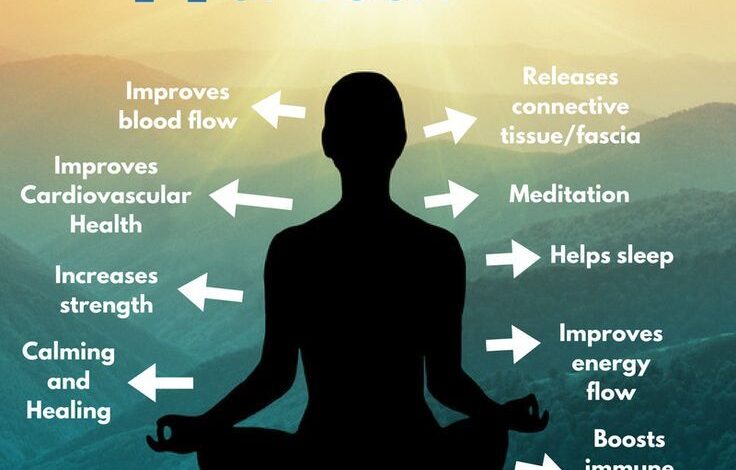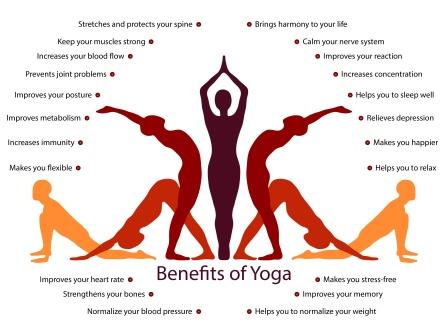Unlock Your Well-being: The Health Benefits of Yoga

The Profound Health Benefits of Yoga: A Comprehensive Guide
Yoga. The word conjures images of serene poses, mindful breathing, and a general sense of well-being. But yoga is far more than just stretching. It’s a centuries-old practice with deep roots in ancient Indian philosophy, and its benefits extend far beyond physical flexibility. This post will delve into the comprehensive health effects of yoga, exploring its impact on the body, mind, and spirit.
The Physical Benefits: Strengthening and Healing
Perhaps the most immediately noticeable benefits of yoga are physical. Increased flexibility is often the first thing people experience. Through regular practice, yoga gently stretches muscles and connective tissues, increasing range of motion. This isn’t just about being able to touch your toes; improved flexibility can reduce the risk of injuries, alleviate chronic pain, and improve posture.
But yoga isn’t just about flexibility. It’s also a powerful way to build strength. Many poses require you to support your own body weight, engaging multiple muscle groups simultaneously. Holding poses like Plank, Chair Pose, and Warrior poses builds strength in the arms, legs, core, and back. Unlike traditional weightlifting, yoga focuses on functional strength – the kind of strength you use in everyday movements.
Beyond strength and flexibility, yoga can significantly improve balance and coordination. Poses like Tree Pose and Eagle Pose challenge your balance, forcing your body to engage stabilizing muscles. This is particularly beneficial as we age, as balance tends to decline, increasing the risk of falls.
The benefits don’t stop there. Yoga can also contribute to:

- Improved cardiovascular health: Certain styles of yoga, like Vinyasa and Ashtanga, are quite physically demanding and can elevate your heart rate, improving cardiovascular fitness.
- Pain management: Yoga has been shown to be effective in managing chronic pain conditions like lower back pain, arthritis, and carpal tunnel syndrome.
- Better respiration: Yoga emphasizes deep, conscious breathing (pranayama), which can increase lung capacity and improve respiratory function.
- Improved posture: Many poses counteract the effects of prolonged sitting and poor posture, helping to align the spine and strengthen core muscles.
The Mental and Emotional Benefits: Calming the Mind
While the physical benefits of yoga are substantial, its impact on mental and emotional well-being is arguably even more profound. In today’s fast-paced world, stress and anxiety are rampant. Yoga provides a powerful antidote.
Stress reduction is a key benefit. The combination of physical postures, controlled breathing, and meditation helps to calm the nervous system and reduce the production of cortisol, the stress hormone. Regular yoga practice can help you develop a greater resilience to stress, allowing you to cope with challenges more effectively.
Yoga also promotes mindfulness – the practice of paying attention to the present moment without judgment. By focusing on your breath and body sensations during practice, you learn to quiet the chatter of the mind and cultivate a sense of inner peace. This mindful awareness can extend beyond the yoga mat, helping you to be more present and engaged in all aspects of your life.
Furthermore, yoga can be a powerful tool for managing anxiety and depression. Studies have shown that yoga can increase levels of GABA, a neurotransmitter that has calming effects on the brain. It can also help to regulate the nervous system and improve mood.
Improved focus and concentration are also frequently reported benefits. The discipline required to hold poses and maintain mindful breathing can translate into improved cognitive function and a greater ability to focus on tasks.
The Spiritual Benefits: Connecting to Something Larger
For many, yoga is more than just a physical and mental practice; it’s a spiritual journey. While not necessarily tied to any particular religion, yoga encourages self-reflection and a deeper connection to oneself and the world around us.
Increased self-awareness is a core component of this spiritual aspect. Through yoga, you learn to tune into your body’s sensations, your thoughts, and your emotions, gaining a deeper understanding of who you are.
Yoga can also foster a sense of inner peace and contentment. By cultivating mindfulness and letting go of attachments, you can find a sense of freedom and joy that transcends external circumstances.
Finally, yoga can help you to connect to something larger than yourself – whether that’s a sense of universal consciousness, a connection to nature, or a belief in a higher power. This sense of connection can provide meaning and purpose in life.
Different Styles of Yoga: Finding What Works for You
It’s important to note that there are many different styles of yoga, each with its own unique focus and intensity. Some popular styles include:
- Hatha Yoga: A gentle, foundational style that focuses on basic poses and breathing techniques.
- Vinyasa Yoga: A more dynamic style that links breath to movement, creating a flowing sequence of poses.
- Ashtanga Yoga: A rigorous, physically demanding style that follows a specific sequence of poses.
- Restorative Yoga: A deeply relaxing style that uses props to support the body in passive poses.
- Yin Yoga: A slow-paced style that targets deep connective tissues.
Experimenting with different styles is a great way to find what resonates with you and meets your individual needs.
Getting Started with Yoga
If you’re new to yoga, it’s best to start slowly and listen to your body. Consider taking a class with a qualified instructor who can provide guidance and modifications. There are also many online resources available, including videos and tutorials. Remember to consult with your doctor before starting any new exercise program, especially if you have any underlying health conditions.
Yoga is a journey, not a destination. Be patient with yourself, embrace the process, and enjoy the many benefits that this ancient practice has to offer.



